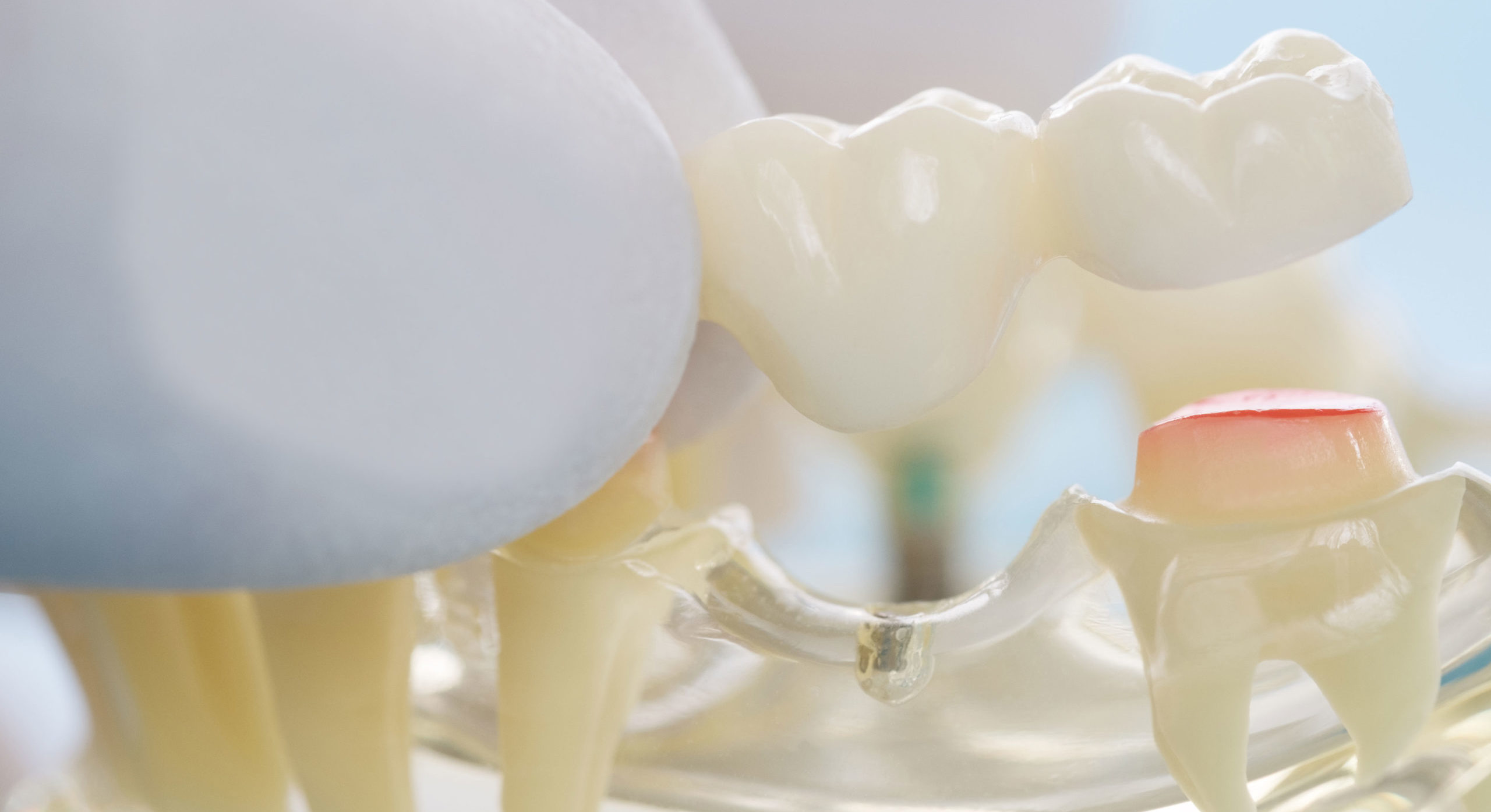DENTAL CROWNS & BRIDGES
Applications for Bridges & Crowns
With some cases involving missing teeth, dental bridges can be used to “bridge the gap” so to speak.
There are four primary types of bridges, including:
- Traditional
- Implant-supported
- Cantilever
- Maryland
If you’re missing teeth, there are options available to consider. There are lots of benefits with dental bridges, and just as many factors, including the obvious: costs. Bridges and crowns are a great alternative to more costly dental implants. Be sure to discuss all the options in detail with your dentist.
Grey Container – do not delete or move.
Benefits of Bridges & Crowns
Cost, Lifespan, Function & More
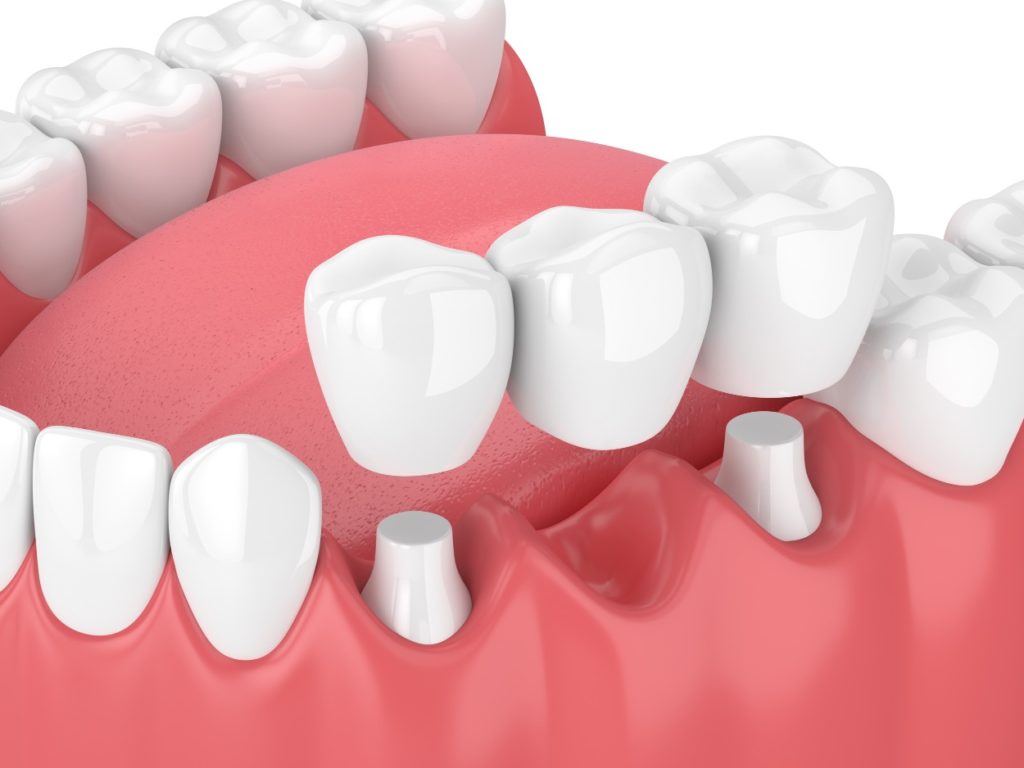
Traditional Dental Bridge
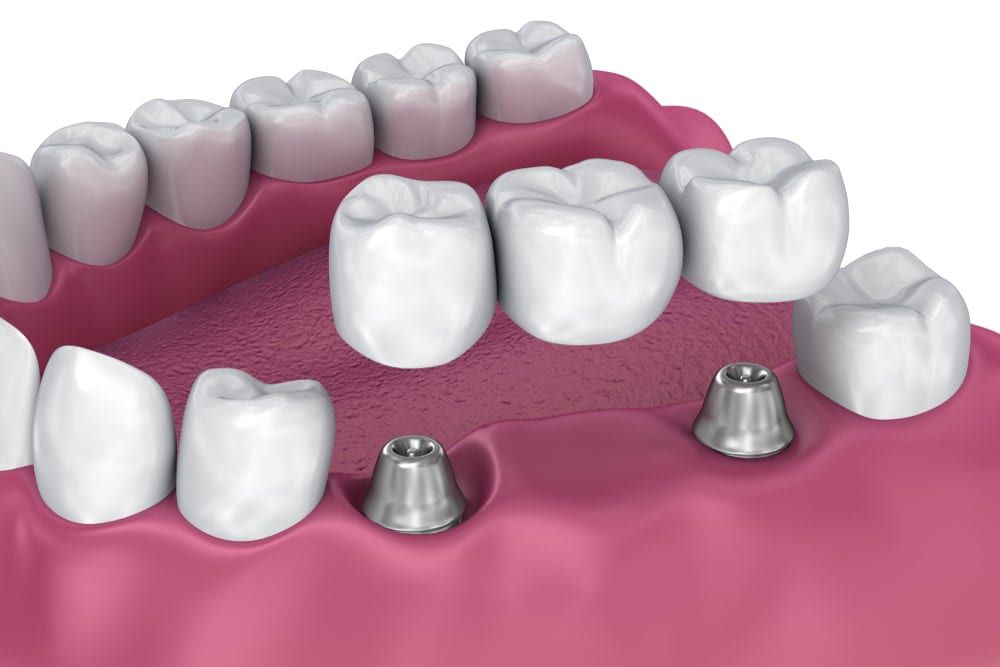
Implant Supported Dental Bridge
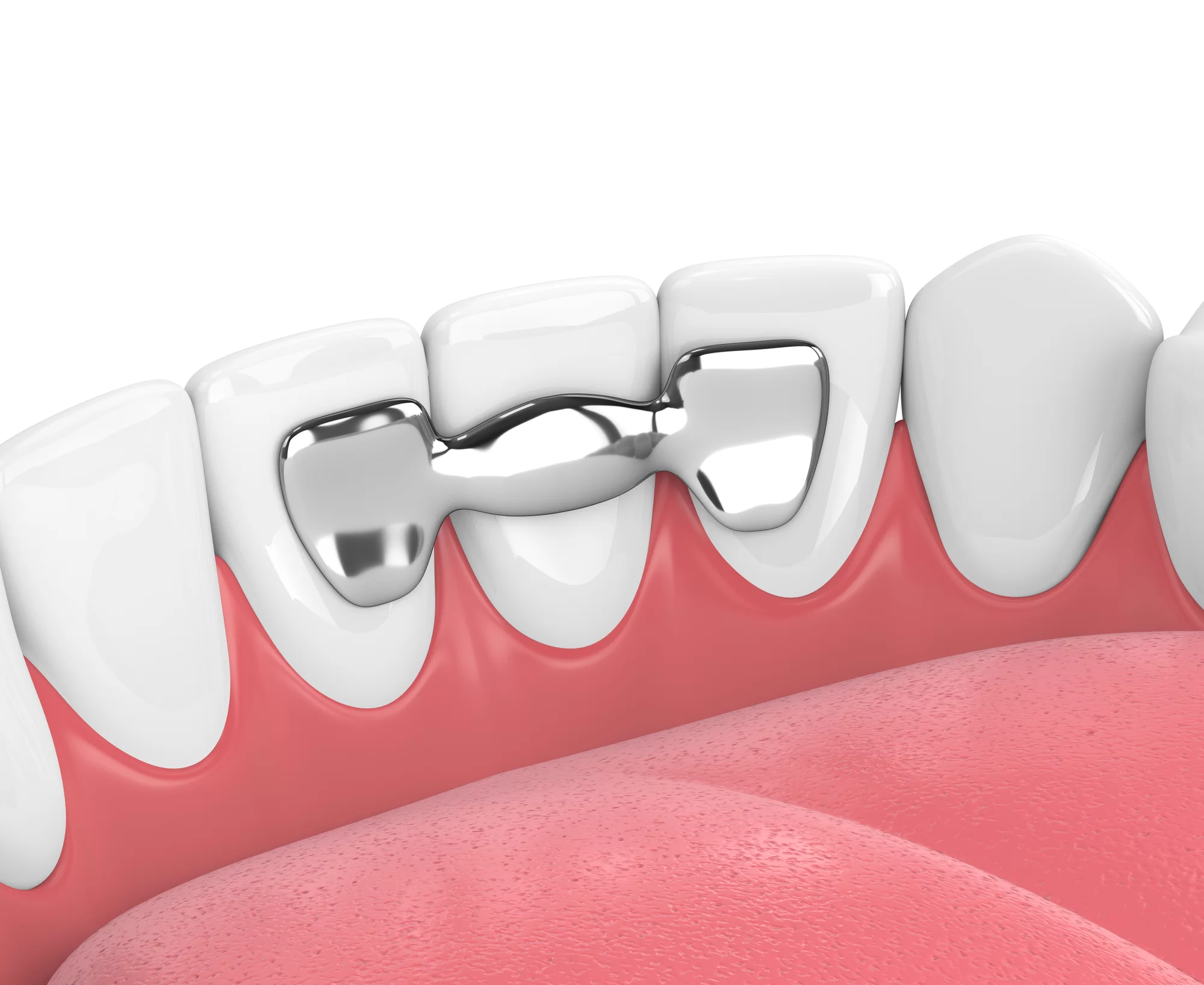
Maryland Dental Bridge
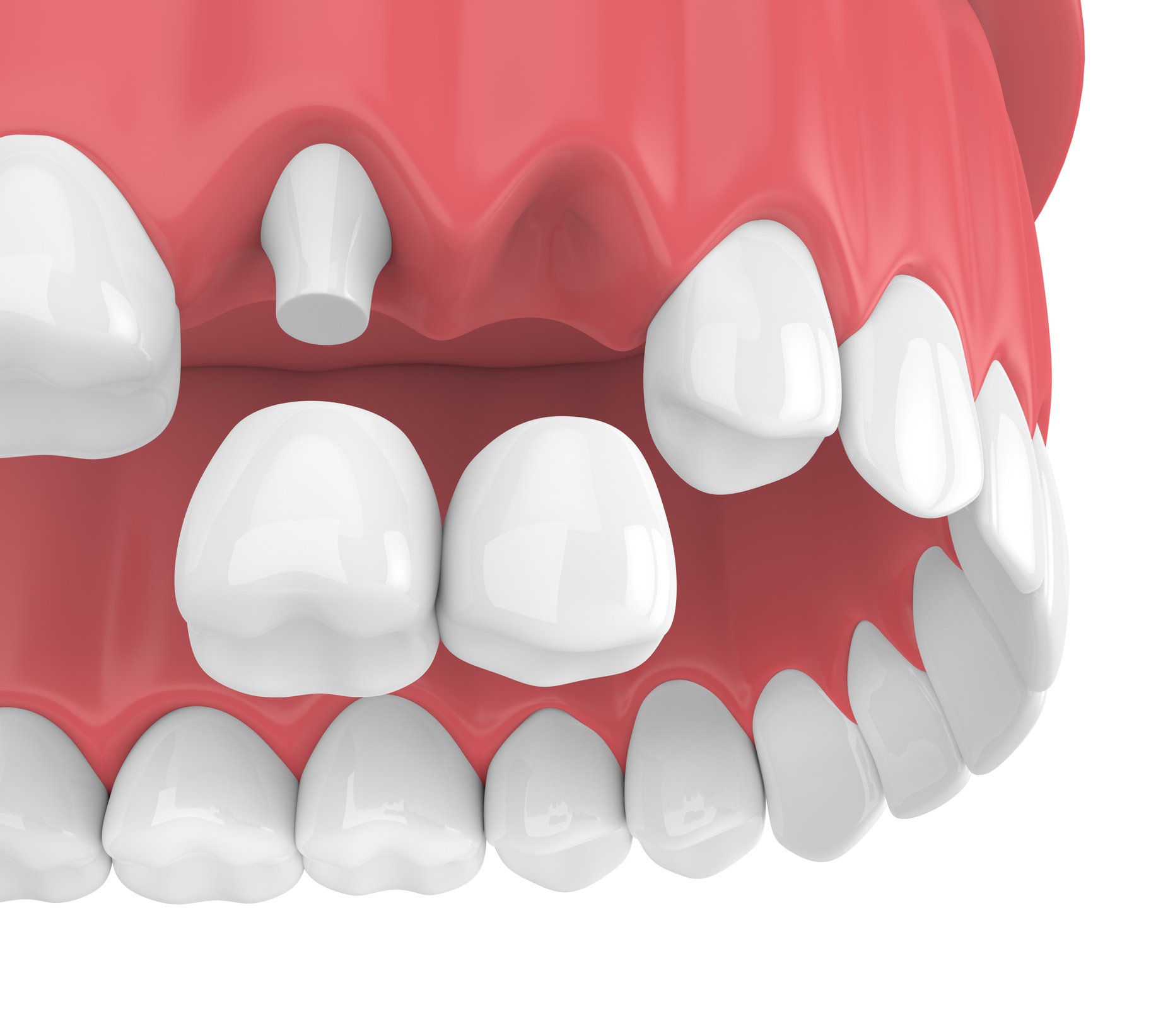
Cantilever Dental Bridge
There are many advantages in choosing a dental bridge, but before we get into that, let’s look at the three main types in a little more detail.
Traditional Dental Bridges
This type of dental bridge involves attaching crowns on either sides of the missing tooth (or teeth), with a false tooth in the middle. The dental crowns hold the bridge in place as they are cemented to the supporting teeth. Traditional bridges are the most common & popular type.
For a traditional bridge to work, you must have natural teeth on both sides of the gap to anchor the crowns in place (otherwise it’s an implant supported bridge, see below). Traditional bridges are made of ceramics or porcelain and are fused to metal.
Implant Supported Bridges
Implant supported bridges secure the bridge to two dental implant on either side. Implant supported bridges are the most robust and secure type. Studies have proven that traditional bridges have a 15-20% failure rate within ten years, while implant supported bridges see less than a 2% failure after ten years.
This bridge type normally requires at least two procedures: the first to imbed the dental implants into the jawbone, and the second to place the actual bridge.
Cantilever Dental Bridges
Cantilever bridges are very similar to traditional bridges, in that a dental crown holds the bridge in place, however only one natural tooth is required. A single crown is cemented to that tooth as opposed to connecting to two crowns.
Cantilever bridges are not used very often, as they can damage other teeth due to excess force when used at the back of the mouth (where bridges are commonly required).
Maryland Dental Bridges
A Maryland bridge, named from where they were initially created, the University of Maryland, relies on natural teeth, similar to the traditional bridge, but Maryland bridges use metal, porcelain, or porcelain fused to metal, bonded to the backside of the teeth.
This type of bridge is not intended for molars, rather for teeth in the front of the mouth. They aren’t used that often, largely due to the fact that the bond can be broken when eating certain types of foods.
Dental Bridge Costs
Traditional & Cantilever Bridges – Both types range from $2,000 to $5,000. That includes one pontic and a crown for each abutment tooth.
Maryland Bridges – The average cost is $1,500 to $2,500. That includes one pontic and the accompanying framework attached to the abutment teeth.
Implant Supported Bridges – Implant supported bridges range between $5,000 to $15,000, assuming a bridge with two dental implants that span three or four teeth.
Find Out What Implants Will Cost
Save $300 On All Dental Implant Appointments. Our Professionals Will Create a Customized Dental Implant Treatment Plan Based on Your Situation and Budget.
705-739-6725
Includes 30 Minute Consultation – Diagnostic Imagery/Radiography Extra.
PROCESS & PROCEDURE
What You Can Expect
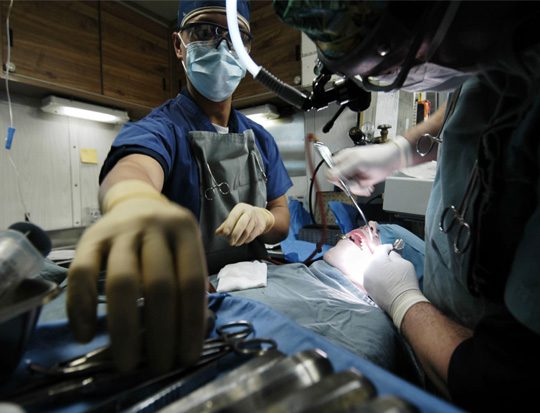
Dental Bridge Procedure
Aside from the initial consultation, the dental bridge procedure spans at least two appointments. This depends on your specific situation, i.e. do we need to extract teeth as part of the process, what type of bridge have you selected, and other factors.
Your first treatment appointment will either involve preparing the abutment teeth to allow for crown placement, or placement of the two supporting implants. If we’re using implants, these are surgically embedded into the jawbone to provide a solid foundation for the bridge. If there isn’t sufficient bone volume, a bone graft may be required. We’ll figure all this out in your initial consult, which is free if we’re using implant supported bridges.
Once the implants are in place, in some cases your tooth can be added right away, however it’s more typical for things to take between 2 to 6 months to fully heal up, and the implant to fully bond.
Next we take teeth impressions to be used as a model for the bridge, the pontic, and the crowns. We’ll also fit you with a temporary bridge to protect your exposed teeth and gums until the bridge is ready.
On your second or third appointment, we’ll replace the temporary bridge with your permanent bridge (after checking for proper fit). An adjustment might be necessary to ensure a correct fit, which could mean an additional appointment.
Remember that everyone’s mouth is unique, so the final number of visits will vary.
Other Treatment Options
Alternatives to Bridges & Crowns
Reasons Bridges & Crowns Might Not Work
There are reasons why you would want to consider other treatment options over dental crowns & bridges, this includes:
- Traditional bridges require putting crowns over healthy teeth. Teeth will be shaved down and capped, which results in losing tooth enamel. Not everyone is willing to risk permanent damage to healthy teeth.
- Maryland bridges involve cementing metal to the back of the teeth, which can do permanent damage to the teeth. These bridges also can’t take the pressure from chewing the way full implants, or implant supported bridges do.
- Bridges don’t address jaw bone loss. Bridges sit above the gum line and don’t have roots, as opposed to implants that use an artificial root screwed into the jaw bone, which transmits your bite force into your jawbone, which prevents additional bone loss.
- Bridges don’t last as long as full implants. Implants are expected to last a lifetime, whereas bridges are anywhere from 5-15 years. Traditional bridges can damage the teeth they are secured to if they aren’t fitted correctly. In addition, bridges can be damaged due to excessive chewing forces.
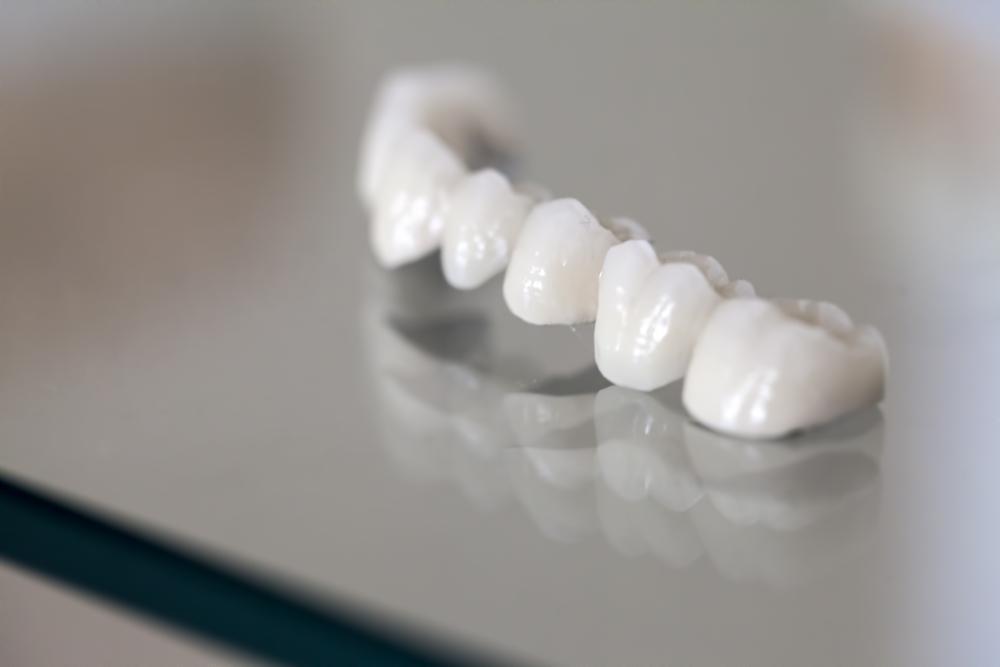
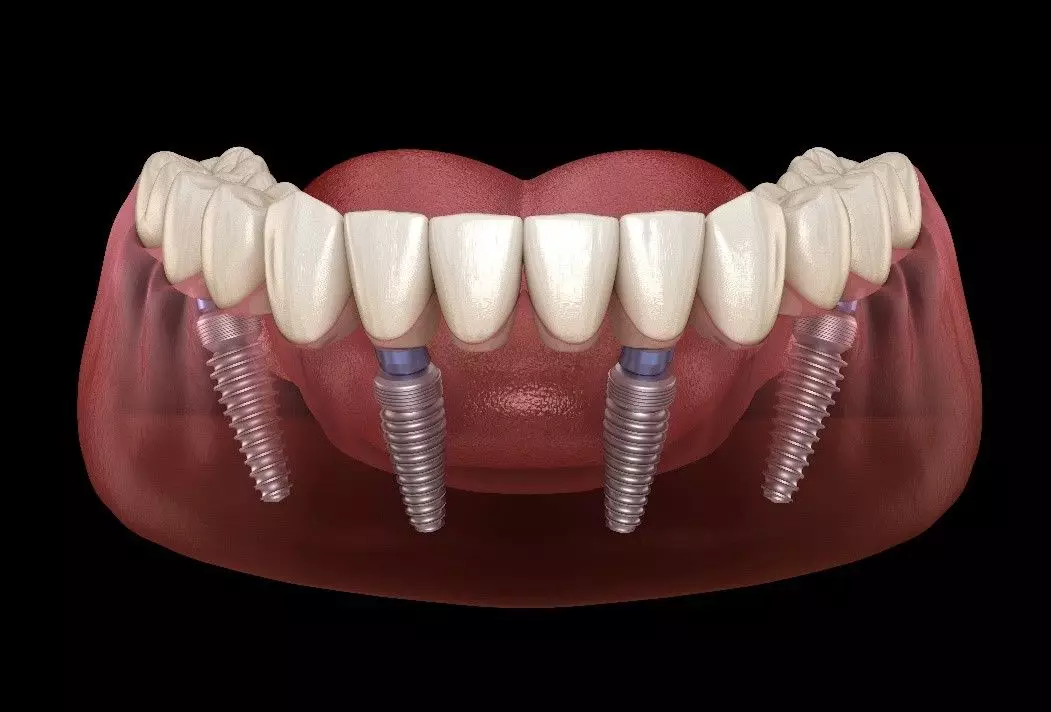
Treatment Option Alternatives
If you’re looking for treatment alternatives to bridges and crowns, here are some options to speak to your dentist about.
Partial Dentures – Partial dentures are removable false teeth. The denture is held in place by a metal framework which is attached to pink, gum-coloured plastic.
The disadvantage of removable partial dentures is that they may not be sturdy enough. They also require special care, and they must be removed and soaked during the night every night.
Dental Implants – In this procedure, your dentist will install a small screw-like titanium post into your jawbone to replace the root of the missing tooth. This metal post provides the anchor to the crown, which will be placed by your dentist atop the implant once the implant has fully healed into your jawbone. A dental implant serves as a solid and enduring replacement to your original tooth.
The process of getting dental implants involves several procedures which are scheduled over the course of several months. They tend to last much longer than dental bridges do, because a bridge can get loose over time. Indeed, dental implants usually last for a lifetime.
Getting Started
Your Initial Appointment
Planning is the most essential first step in a successful outcome. This begins with your first appointment, where you’ll meet with one of our skilled dental surgeons, who will perform a thorough evaluation of your current oral state, discuss what your goals are, and listen to any of your concerns. From there, together we’ll develop a tailored treatment plan that will deliver the results you’re after.
Find Out What Implants Will Cost
Save $300 On All Dental Implant Appointments. Our Professionals Will Create a Customized Dental Implant Treatment Plan Based on Your Situation and Budget.
705-739-6725
Includes 30 Minute Consultation – Diagnostic Imagery/Radiography Extra.
Georgian Dental – Barrie Clinic Reviews
See what other patients have to say about their experience at Georgian Dental.
